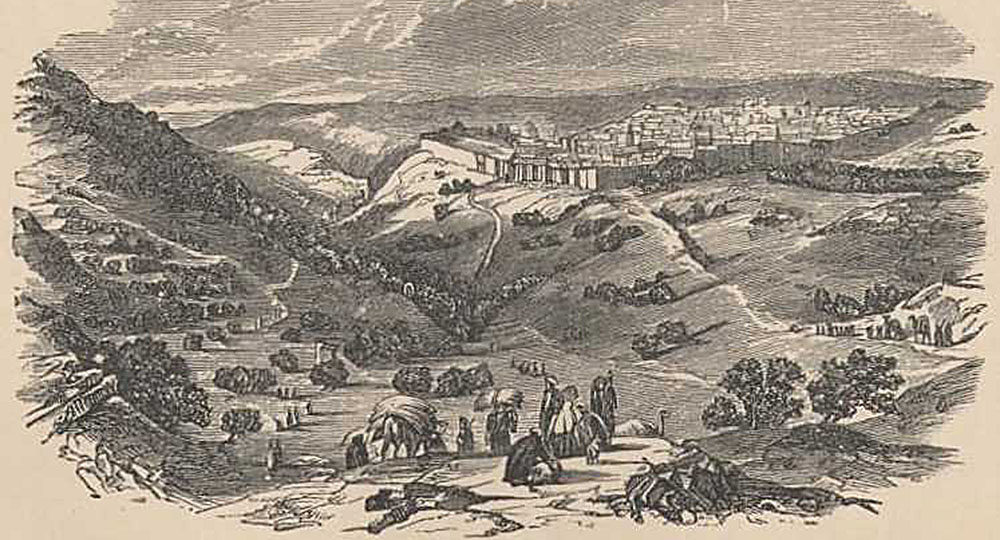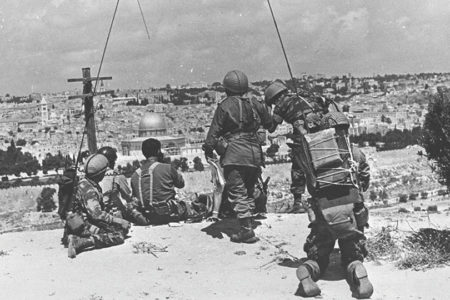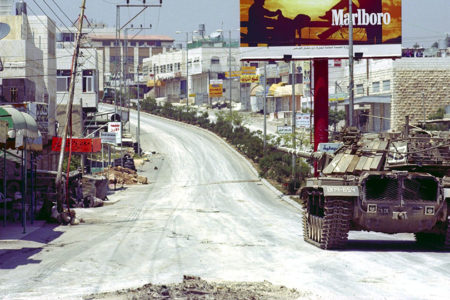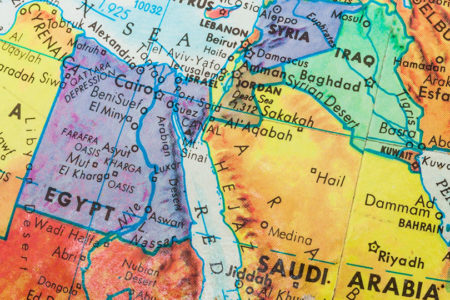A History of the Holy Land
From the Promise to the Captivity
2126 B.C.
God calls Abraham to the land of Canaan (Gen. 12:1–3).
1913 B.C.
God cuts an unconditional covenant with Abraham and tells him the boundaries of the land He has given to him and his seed forever (Gen. 15).
1800 B.C.
God confirms the Abrahamic Covenant with Isaac (Gen. 26:1–5).
1760 B.C.
God confirms the covenant with Jacob (Gen. 28:13–15).
1728 B.C.
Joseph is sold into slavery in Egypt (Gen. 37:36).
1706 B.C.
Jacob (now called Israel, Gen. 32:28) and family move to Egypt (Gen. 46:1–26).
1446 B.C.
The Exodus from Egypt (Ex. 14).
1406 B.C.
The Israelite conquest of Canaan begins.
1375 B.C.
Period of the judges.
1050–930 B.C.
The united kingdom (Saul, David, Solomon). In 1000 B.C. David conquers Jerusalem and makes it Israel’s capital.
930–722 B.C.
The divided kingdom (called Israel in the north, Judah in the south). Jerusalem is the capital of Judah.
722 B.C.
Assyria conquers the northern kingdom.
605–586 B.C.
Babylon conquers the southern kingdom
and destroys Solomon’s Temple. The Babylonian Captivity begins.
From the Return to Herod the Great
539 B.C.
Babylon falls to Media-Persia (Dan. 5).
538 B.C.
Persian King Cyrus allows the Jewish people to return home (Ezra 1).
537 B.C.
Jewish people return to Jerusalem under Zerubbabel.
516 B.C.
Second Temple is completed.
458 B.C.
More Jewish people return under Ezra.
445 B.C.
Artaxerxes II sends Nehemiah to Jerusalem to rebuild its walls (Neh. 2).
430 B.C.
Malachi becomes the last prophetic voice, after which begin the 400 “silent” years.
333 B.C.
Alexander the Great conquers Persia, beginning the Greek, or Hellenistic, period.
323 B.C.
Alexander the Great dies and his kingdom is divided between his four generals.
167 B.C.
Antiochus IV (Epiphanes) defiles the Temple.
165 B.C.
Judas, or Judah, Maccabee leads a revolt against Antiochus, cleanses the Temple, and reestablishes Jewish independence under a Hasmonean dynasty.
63 B.C.
Roman General Pompey enters Jerusalem, ending Jewish independence; Julius Caesar assassinated.
37 B.C.
The Romans appoint Herod the Great “king of the Jews” and give him authority over Judea, Samaria, and Galilee.
From Herrod to Muhammad
20 B.C.
Herod begins remodeling the Temple.
6–5 B.C.
Jesus is born in Bethlehem.
4 B.C.
Herod dies; Caesar Augustus divides the territory: Archelaus gets Judea, Antipas gets the Galilee, and Philip gets northeast of Galilee.
26–36
Roman Procurator Pontius Pilate rules Judea.
30
Messiah Jesus dies, arises, and ascends to heaven. Church Age begins on Day of Pentecost (Shavuot).
66–73
First Jewish uprising. Romans destroy Jerusalem and the Temple (A.D. 70) and attack Masada, where 960 Jews commit suicide rather than surrender (A.D. 73).
132–135
Second Jewish uprising. Emperor Hadrian attempts to rebuild Jerusalem as a pagan city called Aeolia Capitolina. Rabbi Akiva leads a rebellion and proclaims military leader Simon Bar Kochba messiah. Jewish people lose access to Jerusalem only and disperse throughout the land. Rome renames Judah, Samaria, and Galilee Palestina, later known as Palestine.
200
Many dispersed Jews return.
312–313
Emperor Constantine embraces Christianity.
330
Constantine moves to Byzantium, renames it Constantinople (Istanbul, Turkey), and keeps control over Palestine.
570
Muhammad ibnAbd Allah is born in Mecca (Saudi Arabia).
From Muhammad to the Ottoman Turks
622
Muhammad moves to Medina (Saudi Arabia). His move is called the hijrah, Arabic for “emigrate.” The Muslim calendar begins with this date, which is 1 A.H.
610
Muhammad claims the angel Gabriel showedhim a tablet stating he was to become God’s messenger. From then until his death, Muhammad has “visions.” Thus begins the Muslim religion of Islam, meaning “submission to Allah.”
630
Arab Omayyads become the first Muslimpresence in Jerusalem.
632
Muhammad dies.
639–661
Arab Muslims rule. This 22-year-period is the only time Arabs ever rule the land. Even then it was part of a greater empire.
661–1099
Muslims rule Palestine; however, they are not Arabs. The Abbassids came from Baghdad; the Fatimids, from Cairo; the Seljuks from Turkey.
1099–1187
Catholic Crusaders under Pope Urban II conquer Jerusalem and massacre Jews and Muslims.
1187
Saladin, a Muslim Kurd from Damascus, recaptures Jerusalem and a large part of Palestine.
1244–1303
Asian Mongols depose Saladin’s dynasty. Muslim Mameluks and Mongols struggle for power. The Crusader presence ends in 1291.
1513–17
Muslim Ottoman Turks conquer Palestine.
From the Ottoman Turks to the British
1517
Muslim Ottoman Turks rule Palestine as part of their empire.
1840
Turkish rule fully restored. English leaders begin to discuss the possibility of restoring the Jewish people to their homeland.
1882
Jewish people make aliyahfrom Romania to Palestine.
1890–91
Large wave of Jewish people arrive from Russia.
1894–95
French Capt. Alfred Dreyfus is convicted of espionage on falsified evidence amid rampant anti-Semitism.
1896
Theodor Herzl writes Der Judenstaat, “The Jewish State.”
1897
First Zionist Congress meets in Basle, Switzerland, convened by Herzl. More than 200 participate from 17 countries, establishing the World Zionist Organization “to create for the Jewish people a home in Eretz-Israel secured by law.” The Congress met every year from 1897 to 1901, then every second year, and still meets today.
1901
Zionist Congress establishes the Jewish National Fund (JNF) to raise funds to purchase land in EretzYisrael. The JNF is the largest landowner in Israel (12.5 percent of all land) and purchased more than half of that amount before the reestablishment of the nation.
1904
Second wave of immigration, mainly from Russia and Poland.
1906
First Hebrew high school is founded in Jaffa and art school founded in Jerusalem.
1908–14
Second Yemenite aliyah.
1909
Tel Aviv, the first all-Jewish city, is founded in Palestine.
1910
Kibbutz Degania is founded.
1914–18
World War I.
1917
British General Edmund Allenby conquers Palestine, east and west of the Jordan, ending the Ottoman reign. In November the British issue the Balfour Declaration, supporting a “Jewish Homeland.”
1920
League of Nations gives Britain a mandate over Palestine, with orders to implement the Balfour Declaration.







